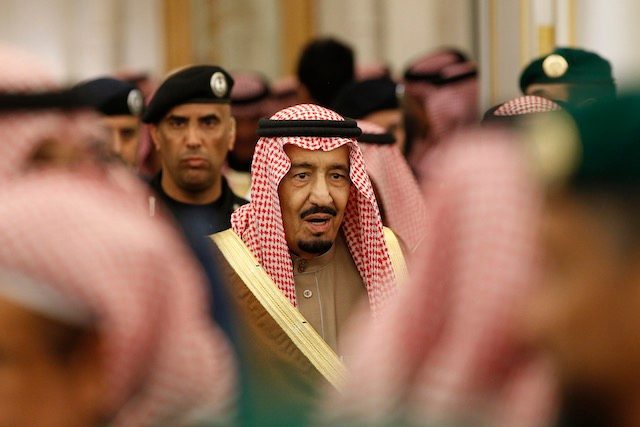SUMMARY
This is AI generated summarization, which may have errors. For context, always refer to the full article.

RIYADH, Saudi Arabia – Saudi Arabia’s King Salman announced a new heir and made his son second in line to rule Wednesday, April 29, concentrating power in his inner circle as the kingdom faces enormous regional challenges.
The major shake-up in the line of succession and cabinet comes with oil giant Saudi Arabia increasingly assertive in the fight against Islamic extremists and in its rivalry with fellow regional power Iran.
Since acceding to the throne following the death of King Abdullah in January, Salman, 79, has been steadily bringing loyalists into the deeply conservative kingdom’s upper reaches of power.
Salman named as the new crown prince his nephew Prince Mohammed bin Nayef, 55, the powerful interior minister who a decade ago led a crackdown on Al-Qaeda.
On the international scene, strategic ally the United States said it would continue its “close, productive relationship” with Saudi Arabia.
Prince Mohammed replaced Prince Moqren bin Abdul Aziz bin Saud, 69, as crown prince.
Moqren, the last son of the kingdom’s founder Abdul Aziz bin Saud in line for the throne, pledged allegiance to his replacement and to the new deputy crown prince at a palace in Riyadh.
It was the first time a Saudi crown prince was relieved of duty.
Salman also named one of his sons, Mohammed bin Salman, to be deputy crown prince – ensuring power will pass to a new generation after his death.
Mohammed, who is in his early 30s, will also remain as defense minister, overseeing the Saudi-led air war against Iran-backed Huthi rebels in Yemen.
“It’s a historical shift really. It’s real generational change,” said a Western diplomatic source.
‘A dangerous phase’
Saudi Arabia’s longtime envoy to Washington, Adel al-Jubeir, 53, was appointed foreign minister, replacing Prince Saud al-Faisal who held the post for 4 decades.
Saud, who had been the world’s longest-serving top diplomat, stepped down for health reasons.
Acting US State Department spokeswoman Marie Harf paid tribute to Saud as “a skilled diplomat, wise counsellor on regional issues, and a good friend to the United States”.
The royal court said Moqren’s removal was a response to “what he had expressed about his desire to be relieved from the position of crown prince.”
Moqren, who had no ministerial portfolio, had been one of the few remaining high-level officials from the era of King Abdullah, who died on January 23 aged about 90.
The new appointments further solidify the hold on power of Salman’s Sudayri branch of the royal family, whose influence had waned under Abdullah.
“These changes are aimed at fostering agreement at the head of the state as it faces a dangerous phase… in its standoff with Iran,” said Abdelwahab Badarkhan, a London-based analyst.
Under Salman, Sunni-dominated Saudi Arabia has adopted a more forceful foreign policy, most clearly shown in its leadership of the Arab coalition targeting Yemen’s Shiite rebels.
The rebels have seized control of large parts of Yemen, prompting President Abedrabbo Mansour Hadi to flee to Riyadh.
Syria strikes, unrest at home
The Saudi-led strikes were launched last month as Riyadh feared a Tehran-friendly regime seizing control of its southern neighbor.
Saudi Arabia is a member of the US-led coalition carrying out air strikes against Islamic State (ISIS) group jihadists in Syria and Iraq and has faced unrest at home.
Authorities said this week they had arrested 93 jihadists since the end of 2014, most of them linked to ISIS, and foiled several plots to carry out attacks across the kingdom.
Mohammed “is held in high regard” by Washington because of his success against Al-Qaeda and his efforts to rehabilitate extremists, according to David Ottaway, a senior scholar at the Wilson Center in Washington.
The new foreign minister Jubeir – a rare member of the Saudi ruling elite not from the royal family – has been Riyadh’s ambassador to Washington for 8 years and at the forefront of the kingdom’s public relations efforts.
The shake-up also saw Salman name Khalid al-Falih, the head of oil giant Saudi Aramco, as health minister.
Ali al-Naimi retained his 20-year position as the OPEC kingpin’s oil minister.
Labour Minister Adel Fakieh was moved to the post of economy and planning, as the kingdom seeks to diversify its oil-based economy.
But the country’s highest-ranking female official, Nora bint Abdullah al-Fayez, was let go from her post as deputy minister of education for girls. – Ian Timberlake, AFP / Rappler.com
Add a comment
How does this make you feel?
There are no comments yet. Add your comment to start the conversation.